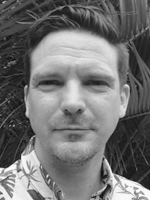Dr. Tom White

Areas of Interest
- Fijian Politics
- Religion and Law
- Religion and Politics
- Secularisation and Socio-Cultural Change in the Pacific Islands
Pacific secularities: Religion, race and Fiji’s secular state
Fiji and its neighbouring Pacific Island states compose a largely unexamined set of jurisdictions for exploring multiple secularities in the contemporary world. In early anthropological accounts of Pacific island societies – and later in Indigenous cultural self-description – the prevailing discourse is to distinguish the holistic, relational ontologies of the Pacific which do not separate the religious from the secular, with a Western secularity that does. After a century of missionary Christianity infusing Indigenous life-worlds of ancestor deities, mana and animism, the missiologist Charles Forman declared the Pacific as ‘the most solidly Christian part of the world.’ Yet independence from colonial rule came in the form of anglophone common law constitutions, and tied these solidly Christian cultures to legal regimes where a separation of church and state is held integral to protecting religious freedom. As tight-knit cooperative village economies have become increasingly swept up into a market capitalism, undermining local chief-church establishments and energising a more person-centred, anti-custom Pentecostalism, a new politics of religion seeking to safeguard Indigenous Christian culture has unfolded, but this is still pursued through the secular apparatus of modern constitutional law.
Fiji has experienced similar social upheaval to other Pacific Island states, but its politics of religion is distinct, compounded by a demographics ethnically split between the Indigenous Christian iTaukei and the Hindu and Muslim Indo-Fijians, who first arrived into the former British colony as indentured labourers in 1878. Fiji’s subsequent ‘politics of race’ has involved military coups in 1987, 2000 and 2006, and has been marked by an interlocking dynamic of two distinct and competing secularities, articulated respectively in demands to declare Fiji as either a Christian or secular state. Both of these secularities underpinned the takeover of state by military strongmen who assumed the sovereign exception by making the resetting of Fiji’s religion/secular binary an existential concern, either to prevent the cultural annihilation of the Indigenous Fijians, or to protect religious freedom and avoid major inter-religious conflict.
Drawing data from over 9,000 public submissions to Fijian constitution-drafting bodies (1987, 1988-89, 1995-96, 2007-08, 2012), the 2017 sedition trials for provincial Christian state separatists, and the long-standing controversy on the right of state-supported religious schools to recruit headteachers on the basis of religion, this study maps the history, politics and effects of Fiji’s military-drafted 2013 Constitution declaring a ‘secular state.’ Fiji’s own multiple secularities are contrasted against those of the overwhelmingly Christian Pacific nations of Papua New Guinea and Samoa, where public inquiries into religious freedom and constitutional reforms declaring Christianity as the state religion have documented lawmakers scrutinising the merits of their own colonially-established religion/secular distinctions. Through this approach, population size, linguistic plurality, inter-religious and intra-Christian diversity, legal pluralism, colonial policy and political stratification (i.e. Polynesian chiefs and Melanesian big men) are considered as factors affecting the Pacific’s various pathways to its own forms of secularity.
Biography
Postdoctoral Fellow, Religion Programme, Otago University, Dunedin (NZL)
Assistant Research Fellow, Religion Programme, Otago University, Dunedin (NZL)
Doctoral Candidate, Religion Programme, Otago University, Dunedin (NZL)
Lecturer, Department of Ethics and Governance, Fiji National University, Suva (FJI)
M.A. Religion and Society, Durham University, Durham (UK)
M.A. (Hons) Philosophy and Politics, University of Edinburgh, Edinburgh (UK)
Relevant Publications
- White, Thomas A. J., and J. Shaver. “Mapping Rural Fijian Socio-Economic Networks and Religious Change in Light of Pacific Research Methodologies.” Pacific Dynamics (forthcoming).
- White, Thomas A. J. “Are Fiji’s Military Strongmen Populists?” In Routledge Handbook on Populism in Asia Pacific. Edited by D. B. Subedi et al. London: Routledge (forthcoming).
- White, Thomas A. J., and M. Mua. “The Mandatory Ethics and Governance Courses in Fiji’s Universities: Institutional Ecologies, Teaching Philosophies and the (Ethical) Future of Tertiary Education in the Pacific.” Journal of Higher Education Policy and Management (forthcoming).
- Shaver, John H., Thomas A. J. White, Patrick Vakaoti, and Martin Lang. “A Comparison of Self-Report, Systematic Observation and Third-Party Judgments of Church Attendance in a Rural Fijian Village.” PloS one 16, no. 10 (2021): 1-13.
- White, Thomas A. J. “Christianity and Climate Change Adaption: Sea-Level Rise and Ritualising Village Relocation in Fiji.” Sites: a journal of social anthropology and cultural studies 16, no. 1 (2019): 44–69.
- White, Thomas A. J. “How Novel Is the Secularism of Fiji’s 2013 Constitution.” Journal of South Pacific Law, 2017, 73–100.
- White, Thomas A. J. “The Secular as an Event: Religion on the Other Hand.” Double Dialogues, no. 16 (2013).


